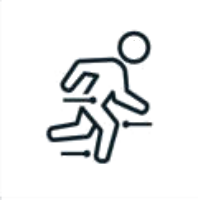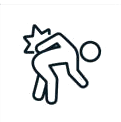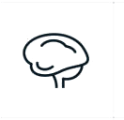Neuro Rehabilitation in Goregaon, Mumbai
Overview
Neuro rehabilitation is an essential process designed to help individuals regain movement, coordination, and independence following neurological conditions such as strokes, traumatic brain injuries, spinal cord injuries, or other disorders affecting the nervous system. Early intervention and specialized rehabilitation play a crucial role in minimizing long-term disability and improving overall quality of life.
At Physio Lounge Clinic, we specialize in providing personalized neuro rehabilitation programs in Goregaon, Mumbai. Our experienced neuro physiotherapists use advanced techniques and tailor-made treatment plans to assist individuals in regaining their motor functions, enhancing coordination, and supporting long-term recovery.
Your neurological health cannot wait. Take the first step towards recovery—contact Physio Lounge Clinic today for expert neuro rehabilitation in Mumbai!
Benefits of Neuro Rehabilitation

Improved motor function.

Enhanced Coordination
Increased Independence

Pain Management

Mental and Emotional Support

Preventing Complications of neurological damage.
Key Features
Neurological physiotherapists are experienced and trained to treat neurological conditions with the aim to provide interventions which assist an individual to regain or maintain their maximum movement and functional independence. This is achieved by aiding in the development of new pathways through repetition and exercise.
Role of Our Neuro Rehabilitation Physiotherapists
At Physio Lounge Clinic, our neuro rehabilitation physiotherapists play a crucial role in helping patients recover and regain function after neurological impairments. Here’s how our skilled team supports your journey:
- Customized Treatment Plans: Tailored rehabilitation programs that cater to your specific neurological condition and recovery goals.
- Supervised Physical Therapy: Guidance through safe and effective exercises designed to improve muscle strength, flexibility, and coordination.
- Functional Training: Activities aimed at regaining the ability to perform everyday tasks independently.
- Pain Management Techniques: Specialized methods to alleviate nerve-related pain and discomfort.
- Use of Assistive Devices: Support with the use of mobility aids, braces, and adaptive tools.
- Emotional and Psychological Support: Encouragement and strategies to boost mental well-being and manage anxiety or depression.
How Do I Know If I Need
Neurological Physiotherapy?
Neuro rehabilitation is essential if you or a loved one have experienced neurological impairments. You may benefit from this program if you:
Have had a stroke or a brain injury
Recently underwent spinal cord surgery
Are dealing with movement impairments due to neurological conditions like Parkinson’s disease
Are experiencing persistent weakness, numbness, or difficulty walking
Have balance problems that put you at risk of falling
Want to regain movement and independence after a neurological event
If you notice any of these signs or have been advised by your healthcare provider to focus on neurological recovery, neuro rehabilitation can help you regain strength, improve your function, and live a more independent life.
Schedule a consultation at Physio Lounge Clinic today to find out if neuro rehabilitation is right for you!
Our Patient Story
Patient is a 35 year-old caucasian male diagnosed with Multiple Sclerosis that began three years ago. The patient was referred to physiotherapy to help manage his weakness, coordination and fatigue. Additionally, the patient is looking to learn how to self manage his symptoms.
He has been undergoing neuro rehabilitation since 1 year which includes:
Strength training
Endurance training
Coordination training
Postural Correction exercise
Energy Conservation techniques
Our Patient Story
Case Study
Patient is a 35 year-old caucasian male diagnosed with Multiple Sclerosis that began three years ago. The patient was referred to physiotherapy to help manage his weakness, coordination and fatigue. Additionally, the patient is looking to learn how to self manage his symptoms.
He has been undergoing neuro rehabilitation since 1 year which includes:
Strength training
Endurance training
Coordination training
Postural Correction exercise
Energy Conservation techniques
Treatment Procedures in Neuro Rehabilitation
Our neuro rehabilitation treatment begins with a thorough assessment of your neurological function, strength, flexibility, and coordination. Based on this evaluation, we design a personalized treatment plan that caters to your unique needs.
The treatment procedures may include:
- Motor Control Exercises: Activities that retrain the nervous system to improve muscle function and movement.
- Manual Therapy: Hands-on techniques to relieve muscle tightness and improve flexibility.
- Electrical Stimulation: Used to stimulate nerve function and muscle strength recovery.
- Cognitive Exercises: Exercises aimed at improving memory, problem-solving, and concentration.
- Functional Activities: Daily tasks-based exercises that focus on regaining independence.
- Pain Management Techniques: Strategies to manage nerve pain and discomfort effectively.
- Assistive Device Training: Guidance on the use of braces, mobility aids, and other assistive tools.
These procedures work together to help you rebuild strength, improve motor function, and enhance overall quality of life.
Our Approach & What to Expect on Your First Visit
During your first visit, you will undergo a comprehensive assessment that evaluates your neurological function, strength, flexibility, and coordination. Our physiotherapists will take the time to understand your specific condition, your recovery goals, and any lifestyle adjustments you may need. Based on this assessment, a tailored treatment plan will be developed that aligns with your unique needs.
You can expect the following during your visit:
A Detailed Medical Evaluation: We will review your medical history, past neurological conditions, and current symptoms to create the best care plan.
Personalized Treatment Plan: Your plan will include specific exercises, therapy techniques, and lifestyle adjustments tailored to your individual recovery.
Supervised Physical Therapy: Participate in safe and effective physical activities designed to rebuild your strength and improve your overall fitness.
Lifestyle Guidance: Our experts will provide advice on healthy living, stress management, and habits that support long-term neurological health.
Emotional Support: We understand that recovering from neurological impairments can be emotionally challenging. Our team offers encouragement and strategies to keep you motivated throughout your journey.
Frequently Asked Questions
What is neuro rehabilitation?
Neuro rehabilitation is a specialized program designed to help individuals recover and regain their physical, cognitive, and emotional functions after neurological conditions like stroke, brain injury, or other disorders affecting the nervous system.
Who can benefit from neuro rehabilitation at Physio Lounge Clinic?
Neuro rehabilitation at Physio Lounge Clinic is ideal for anyone who has experienced a neurological event, such as stroke, brain injury, spinal cord injury, or conditions like Parkinson’s disease or multiple sclerosis.
What specific neurological conditions can be treated through neuro rehabilitation at Physio Lounge Clinic?
Our neuro rehabilitation program is effective for treating conditions like stroke, brain injuries, spinal cord injuries, Parkinson’s disease, multiple sclerosis, and other nervous system-related disorders.
How long will I need to attend neuro rehabilitation sessions?
The length of your neuro rehabilitation will depend on your individual progress. Our therapists will develop a personalized plan based on your needs, which may last from a few weeks to several months.
What happens during the first visit to neuro rehabilitation at Physio Lounge Clinic?
During your first visit, we’ll conduct a thorough assessment to understand your specific needs, including evaluating your motor function, strength, coordination, and overall neurological health. A customized treatment plan will be created based on this evaluation.
Is neuro rehabilitation only physical, or does it include emotional and cognitive support?
Neuro rehabilitation at Physio Lounge Clinic focuses on a holistic approach, combining physical therapy, cognitive exercises, pain management, and emotional support to aid complete recovery.
Is neuro rehabilitation covered by insurance?
Most health insurance plans cover neuro rehabilitation, but it’s important to confirm your specific coverage details with your insurance provider.
Can family members or caregivers participate in the neuro rehabilitation process?
Absolutely! Family members and caregivers play an important role in supporting the rehabilitation process. We encourage their involvement to help with emotional and physical recovery at home.
How soon after a neurological event should I begin neuro rehabilitation?
It’s recommended to begin neuro rehabilitation as soon as it is safe, usually within a few days or weeks after the event, to maximize your recovery.
Can I continue exercises at home after neuro rehabilitation sessions?
Yes, we provide guidance on exercises and habits that you can safely continue at home to support ongoing recovery and maintain your progress even after sessions end.

